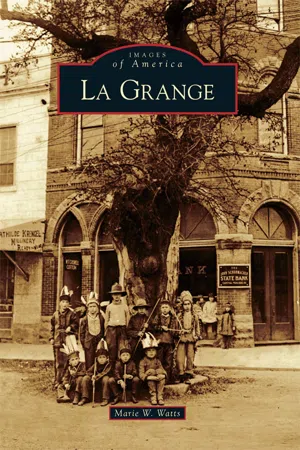La Grange
About this book
La Grange, voted the capital of the Republic of Texas in 1838, is as colorful and audacious as the state itself. Its citizens were instrumental in winning the republics freedom and have always been willing to fight for their beliefs. Many defend La Grange as the true capital of Texas, unfairly stripped of its title. The town flourished during the 19th century and witnessed the birth of a rough-and-tumble society, where arguments were commonly settled with fists, knives, and guns. In later years, immigrants flocked to the area and built a strong agricultural economy. The 20th century might have passed quietly into history if not for a Houston television reporter who publicized the demise of one of Texass best-known brothels, the Chicken Ranch, located just outside of La Grange. The extensive publicity surrounding the closing of the Best Little Whorehouse in Texas resulted in a musical and movie of the same name, as well as a song by ZZ Top.
Tools to learn more effectively

Saving Books

Keyword Search

Annotating Text

Listen to it instead
Information
Four
WORKING HARD AND PLAYING HARD


Table of contents
- Title Page
- Copyright Page
- Dedication
- Table of Contents
- ACKNOWLEDGMENTS
- INTRODUCTION
- One - NATIVE AMERICANS AND THE SEVEN FLAGS OVER LA GRANGE
- Two - ALWAYS READY FOR A GOOD FIGHT
- Three - WILLING AND UNWILLING IMMIGRANTS
- Four - WORKING HARD AND PLAYING HARD
- Five - THE MIGHTY ARM OF THE LAW
- Six - THE GOOD, THE BAD, AND THE UNLUCKY
- Seven - THE TRUTH ABOUT THE CHICKEN RANCH
Frequently asked questions
- Essential is ideal for learners and professionals who enjoy exploring a wide range of subjects. Access the Essential Library with 800,000+ trusted titles and best-sellers across business, personal growth, and the humanities. Includes unlimited reading time and Standard Read Aloud voice.
- Complete: Perfect for advanced learners and researchers needing full, unrestricted access. Unlock 1.4M+ books across hundreds of subjects, including academic and specialized titles. The Complete Plan also includes advanced features like Premium Read Aloud and Research Assistant.
Please note we cannot support devices running on iOS 13 and Android 7 or earlier. Learn more about using the app
